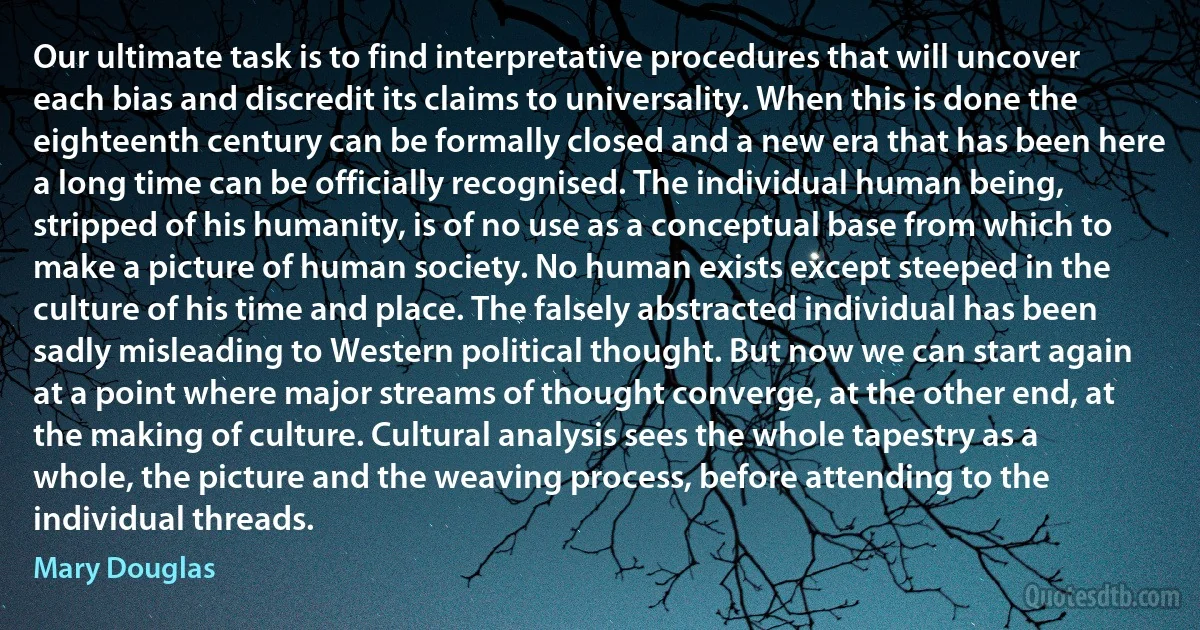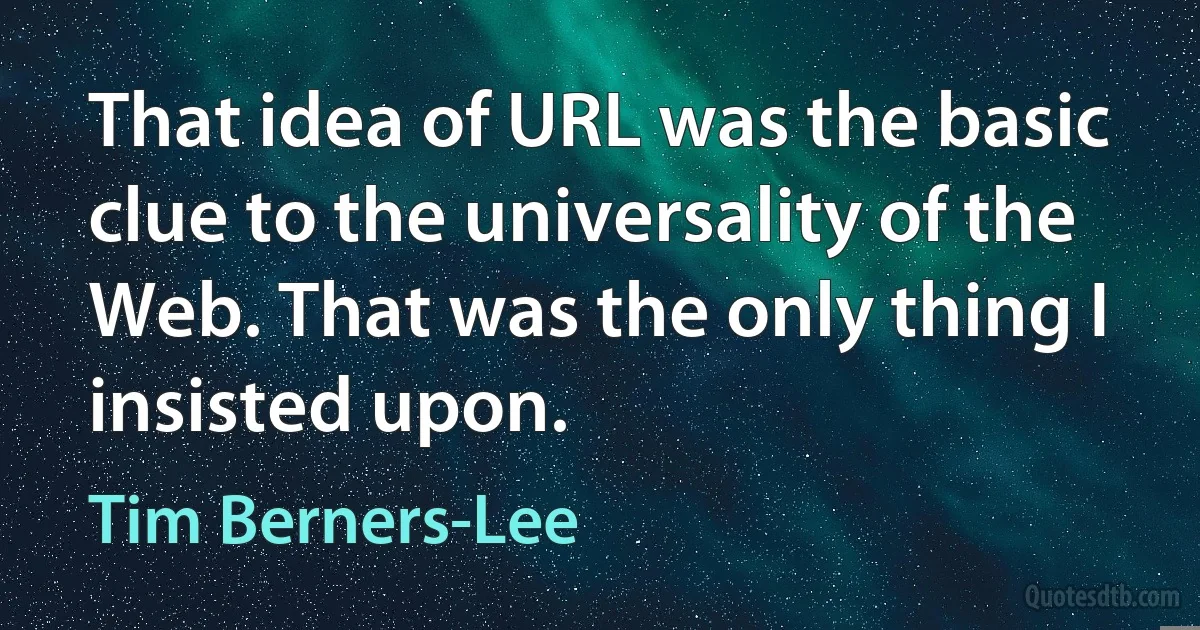Universality Quotes - page 2
When we come to think about the several benefits in regard to their cause, how have they arisen? Have they arisen out of hate of others and injuring others? Of course we should say no. We should say they have arisen out of love of others and benefiting others. If we should classify one by one all those who love others and benefit others, should we find them to be partial or universal? Of course we should say they are universal. Now, since universal love is the cause of the major benefits in the world, therefore Mozi proclaims universal love is right. And, as has already been said, the interest of the magnanimous lies in procuring benefits for the world and eliminating its calamities. Now that we have found out the consequences of universal love to be the major benefits of the world and the consequences of partiality to be the major calamities in the world; this is the reason why Mozi said partiality is wrong and universality is right.

Mozi
We unfold out of the Idea of Space the propositions of geometry, which are plainly truths of the most rigorous necessity and universality. But if the idea of space were merely collected from observation of the external world, it could never enable or entitle us to assert such propositions: it could never authorize us to say that not merely some lines, but all lines, not only have, but must have, those properties which geometry teaches. Geometry in every proposition speaks a language which experience never dares to utter; and indeed of which she but half comprehends the meaning.

William Whewell
The belief that science destroys culture is sometimes supported by historical statements that the arts have flourished only when the sciences have been neglected. This thesis is... directly contrary to history... [I]n the great age of Greece, art and science penetrate one another more closely than in any modern age. ...The example of these men in science as much as in art set the modern world afire in the Renaissance. And the type and symbol of Renaissance man... remains Leonardo da Vinci, painter, sculptor, mathematician, and engineer. No man has shown more strikingly the universality and the unity of the intellect.

Jacob Bronowski
I have a definite feeling for the West, the vast horizontality of the land, for instance... I have always been very impressed with the plastic qualities of American Indian art. The Indians have the true painter's approach in their capacity to get hold of appropriate images, and in their understanding of what constitutes painterly subject-matter. Their colour is essentially Western, their vision has the basic universality of all real art. Some people find references to American Indian art and calligraphy in parts of my pictures. That wasn't intentional; probably [it] was the result of early memories and enthusiasm.

Jackson Pollock
This tendency, however, to ascribe an universality of genius to great men, led Dryden to affirm, on the strength of two smart satyrical lines, that Virgil could have written a satire equal to Juvenal. But, with all due deference to Dryden, I conceive it much more manifest, that Juvenal could have written a better epic than Virgil, than that Virgil could have written a satire equal to Juvenal. Juvenal has many passages of the moral sublime far superior to any that can be found in Virgil, who, indeed, seldom attempts a higher flight than the sublime of description. Had Lucan lived, he might have rivalled them both, as he has all the vigour of the one, and time might have furnished him with the taste and elegance of the other.

Charles Caleb Colton
It is one of the advantages of the revelations which we acknowledge, that whilst they reject idolatry with its many pernicious accompaniments, they introduce the Deity to human apprehension, under an idea more personal, more determinate, more within its compass, than the theology of nature can do. And this they do by representing him exclusively under the relation in which he stands to ourselves; and, for the most part, under some precise character, resulting from that relation, or from the history of his providences. Which method suits the span of our intellects much better than the universality which enters into the idea of God, as deduced from the views of nature.

William Paley
Quirini, in 1676, contended in opposition to Scilla, that the diluvian waters could not have conveyed heavy bodies to the summit of mountains, since the agitation of the sea never (as Boyle had demonstrated) extended to great depths, and still less could the testacea, as some pretended, have lived in these diluvian waters, for 'the duration of the flood was brief, and the heavy rains must have destroyed the saltness of the sea! He was the first writer who ventured to maintain that the universality of the Noachian cataclysm ought not to be insisted upon. ...Visionary as was this doctrine, it gained many proselytes even amongst the more sober reasoners of Italy and Germany, for it conceded both that fossil bodies were organic, and that the diluvial theory could not account for them.

Charles Lyell
The scientist addresses an infinitesimal audience of fellow composers. His message is not devoid of universality but it's universality is disembodied and anonymous. While the artist's communication is linked forever with it's original form, that of the scientist is modified, amplified, fused with the ideas and results of others, and melts into the stream of knowledge and ideas which forms our culture. The scientist has in common with the artist only this: that he can find no better retreat from the world than his work and also no stronger link with his world than his work.

Max Delbrück
Universality is the distinguishing mark of genius. There is no such thing as a special genius, a genius for mathematics, or for music, or even for chess, but only a universal genius. ... The theory of special genius, according to which for instance, it is supposed that a musical genius should be a fool at other subjects, confuses genius with talent. ... There are many kinds of talent, but only one kind of genius, and that is able to choose any kind of talent and master it.

Otto Weininger
Let us turn now to the most elementary principle of just war theory, universality. Those who cannot accept this principle should have the decency to keep silent about matters of right and wrong, or just war. If we can rise to this level, some obvious questions arise: for example, have Cuba and Nicaragua been entitled to set off bombs in Washington, New York, and Miami in self-defense against ongoing terrorist attack? Particularly so when the perpetrators are well known and act with complete impunity, sometimes in brazen defiance of the highest international authorities, so that the cases are far clearer than Afghanistan? If not, why not?

Noam Chomsky
In Mohammedanism the limited principle of the Jews is expanded into universality and thereby overcome. Here, God is no longer, as with the Asiatics, contemplated as existent in immediately sensuous mode but is apprehended as the one infinite sublime Power beyond all the multiplicity of the world. Mohammedanism is, therefore, in the strictest sense of the world, the religion of sublimity.

Georg Wilhelm Friedrich Hegel
The inclination to act as the laws command, a virtue, is a synthesis in which the law ... loses its universality and the subject its particularity; both lose their opposition, while in the Kantian conception of virtue this opposition remains, and the universal becomes the master and the particular the mastered.

Georg Wilhelm Friedrich Hegel
The use of the intellect in the sciences whose primitive concepts as well as axioms are given by sensuous intuition is only logical, that is, by it we only subordinate cognitions to one another according to their relative universality conformably to the principle of contradiction, phenomena to more general phenomena, and consequences of pure intuition to intuitive axioms. But in pure philosophy, such as metaphysics, in which the use of the intellect in respect to principles is real, that is to say, where the primary concept of things and relations and the very axioms are given originally by the pure intellect itself, and not being intuitions do not enjoy immunity from error, the method precedes the whole science, and whatever is attempted before its precepts are thoroughly discussed and firmly established is looked upon as rashly conceived and to be rejected among vain instances of mental playfulness.

Immanuel Kant
The universality of card-playing in the reign of this monarch is evident from a prohibitory statute being necessary to prevent apprentices from using cards except in the Christmas holidays, and then only in their masters' houses...But this moderation, I apprehend, was by no means general, for several contemporary writers are exceedingly severe in their reflections upon the usage of cards, which they rank with dice, and consider both as destructive to morality and good order.

Joseph Strutt



